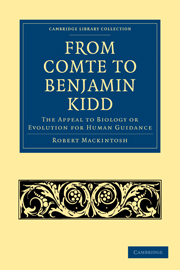Book contents
- Frontmatter
- PREFACE
- Contents
- CHAPTER I INTRODUCTORY
- PART I COMTISM, WITH SOME SCATTERED PARALLELS
- PART II SIMPLE EVOLUTIONISM—SPENCER, STEPHEN
- PART III DARWINISM, OR STRUGGLE FOR EXISTENCE
- CHAPTER XI “DARWINISM IN MORALS”—MISS COBBE'S PROTEST
- CHAPTER XII DARWINISM IN POLITICS—BAGEHOT
- CHAPTER XIII DARWINISM IN ETHICS—PROFESSOR ALEXANDER
- CHAPTER XIV REACTION FROM DARWINISM—HUXLEY
- CHAPTER XV REACTION FROM DARWINISM—DRUMMOND's “ASCENT OF MAN”
- CHAPTER XVI REITERATION OF DARWINISM: ELIMINATION MADE ABSOLUTE—MR. A. SUTHERLAND
- CHAPTER XVII THE METAPHYSICS OF NATURAL SELECTION
- PART IV HYPER-DARWINISM—WEISMANN, KIDD
- Index
CHAPTER XIII - DARWINISM IN ETHICS—PROFESSOR ALEXANDER
Published online by Cambridge University Press: 29 August 2010
- Frontmatter
- PREFACE
- Contents
- CHAPTER I INTRODUCTORY
- PART I COMTISM, WITH SOME SCATTERED PARALLELS
- PART II SIMPLE EVOLUTIONISM—SPENCER, STEPHEN
- PART III DARWINISM, OR STRUGGLE FOR EXISTENCE
- CHAPTER XI “DARWINISM IN MORALS”—MISS COBBE'S PROTEST
- CHAPTER XII DARWINISM IN POLITICS—BAGEHOT
- CHAPTER XIII DARWINISM IN ETHICS—PROFESSOR ALEXANDER
- CHAPTER XIV REACTION FROM DARWINISM—HUXLEY
- CHAPTER XV REACTION FROM DARWINISM—DRUMMOND's “ASCENT OF MAN”
- CHAPTER XVI REITERATION OF DARWINISM: ELIMINATION MADE ABSOLUTE—MR. A. SUTHERLAND
- CHAPTER XVII THE METAPHYSICS OF NATURAL SELECTION
- PART IV HYPER-DARWINISM—WEISMANN, KIDD
- Index
Summary
Prof. Alexander'sMoral Order and Progress is a very full, interesting, and original discussion. Its character, as the sub-title indicates, is “an analysis of Ethical Conceptions.” The general position of the author is that of one struck with the convergence of idealistic and naturalistic ethics in the light of evolutionism; but, while coming himself from the camp of the idealists, Mr. Alexander is strongly inclined to seek a place in the left wing of the partially amalgamated forces. All that is true or solid in idealist ethics is provided for, he thinks, in the biological scheme. As for intuitionalism, it may go packing; there is no portion for it in the promised land of truth ; it is mere mischievous illusion. We have been told by some of Lord Beaconsfield's admirers that there was a great unity throughout his career, in spite of all apparent change—he always disliked the middle classes. Against them he appealed variously to the nobles and the poor, to Tory and Radical instincts. So it is to be with the typical bourgeois philosophy of intuitionalism. Idealists and empiricists are to agree sweetly in destroying it. Its excellent intentions shall not excuse it one cruel blow, in view of its hopeless and irritating limitations.
Having affirmed so strongly the competency of naturalism, Mr. Alexander has to face a question which, in our judgment, presses hard upon all naturalistic ethics.
- Type
- Chapter
- Information
- From Comte to Benjamin KiddThe Appeal to Biology or Evolution for Human Guidance, pp. 124 - 136Publisher: Cambridge University PressPrint publication year: 2009First published in: 1899



